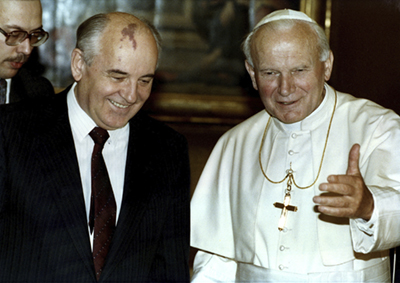
WelCom October 2022
Nobel Peace Prize Laureate Mikhail Gorbachev, the last president of the Soviet Union before its dissolution in 1991, died in Moscow on 30 August 2022, after a protracted illness at the age of 91.
The prominent former Soviet statesman and reformer who lifted the Iron Curtain, leading to the dissolution of the Soviet Union, chartered a new course in the relations with the Holy See, putting an end to decades of religious persecutions against the Catholic Church in the former USSR.
The following article by Lisa Zengarini was published by Vatican News on 31 August 2022.
A leading figure in ending the Cold War
A member of the Communist Party of the Soviet Union since the early fifties, Gorbachev was its general secretary from 1985 to 1991 and Soviet president from 1990 to 1991. During his seven-year tenure, he introduced key political and economic reforms to the USSR, the so-called ‘Peretrojka’ (Reconstruction), and ‘Glasnost’ (Transparency).
He played a crucial role in ending the Cold War which earned him the Nobel Peace Prize in 1990 and widespread popularity in the West, but not at home, where Russians have blamed him for the 1991 implosion of the Soviet Union and for the economic downfall that ensued in Russia in the Nineties.
The historic meeting with Pope St John Paul II in 1989
A political reformer, Gorbachev also chartered a new course in relations with the Holy See, putting an end to decades of religious persecutions against the Catholic Church in the former USSR.
The new course was marked by his historic meeting in the Vatican as General Secretary of the Soviet Communist Party, with Pope St John Paul II, on December 1 1989, less than a month after the collapse of the Berlin Wall, and a year after he had welcomed a top-level Church delegation to Moscow for the celebrations of the Millennium of the Baptism of the Rus’ (1988). [The 1000th Anniversary of the Christianisation of Rus’ (the Baptism of Rus’) was marked by events held in the USSR from May–June 1988, to celebrate the introduction of Christianity to Russia by Prince Vladimir Svyatoslavich in 988.]
Shared values
During that visit St John Paul and Gorbachev had a conversation in which they shared their views on the deep changes then taking place in Eastern Europe, expressing broad agreement on the need for greater religious freedom in the Soviet Union, for a renewal of ethical and moral values, and for improved Catholic-Orthodox relations.
They also agreed on the fact that Eastern European countries should not be expected to simply import Western values wholesale. ‘It would be wrong for someone to claim that changes in Europe and the world should follow the Western model,’ said St John Paul II. ‘Europe, as a participant in world history, should breathe with two lungs,’ the late Pontiff added, using one of his favourite metaphors calling for harmony between East and West on the continent.
Building religious freedom and dialogue in post-Soviet Russia
During the conversation the Polish Pope also expressed concerns about religious freedom in the Soviet Union and the Vatican’s relations with various Orthodox and Catholic denominations, meeting a cautiously positive response from Gorbachev, whose reform plans didn’t originally include changes in the existing Church-State relations.
St John Paul II reiterated these points in his official address to the Soviet leader.
‘In a climate of restored freedom, Catholics will thus be able to work together with their brethren of the Orthodox Church, who are so dear to us. Indeed, we share with them a common patrimony and wish to cooperate with them in a renewed ecumenical commitment to preach the Gospel of Christ to new generations and to work together with them in the vast field of human development, as we await the rebuilding of that unity which Christ willed for his Church.’
Gorbachev paid another visit to the Vatican as President of the USSR in 1990, when his government passed a law on freedom of religion abolishing restrictions on Churches and legalising the Ukrainian Catholic Church after decades of persecution.
He met up again in Rome with St John Paul II ten years later, on November 13, 2000, on the occasion of the World Summit of Nobel Peace Laureates. Speaking to Vatican Radio’s Alessandro Gisotti on the topics discussed at the event, he gave an insight into the challenges of our times which sound prophetic today. In the interview, he warned that: ‘Nowadays there are processes that lead not so much to disarmament, but rather to the danger of nuclear weapons proliferation.’ Speaking about the post-Cold War global order, he echoed the Pope’s call for ‘a more stable, just and humane’ world.
Gorbachev’s interview with ‘Der Spiegel’ in 2015 on the conflict in Eastern Ukraine
More recently, in an interview with the German weekly Der Spiegel in 2015, he warned that the fighting in the Donbas region in Eastern Ukraine, could lead to a major military conflict and condemned the economic sanctions against Moscow, lamenting what he called a ‘catastrophic loss of trust’ between Russia and the West.